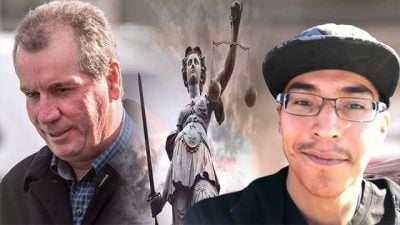The Young Cree Man from Saskatchewan. Without Truth There Is No Reconciliation: Two Colten Boushie Stories

This important article was first published on GR in March 2018.
It seems there are two versions of the August 2016 death of Colten Boushie, the young Cree man from Saskatchewan.
The most repeated one is that he and four friends drive from Red Pheasant First Nation to a farmer’s yard, seeking help for their SUV’s flat tire. There they encounter a racist white farmer who, in no time, shoots Colten Boushie dead. Then, going from bad to worse, an all-white jury acquits Gerald Stanley, the farmer, of murder and manslaughter charges, accepting his obvious lie that he killed a man accidentally. No one, of course, believes his version, including the prime minister, justice minister and assorted other ministers, who embrace the Boushie family and promise a better future, where racist juries would not exist and convictions would occur with ease in cases where the victim is Indigenous. Because of this colossal injustice thousands of Canadians sign “Justice for Colten” petitions asking the verdict be annulled. Marching and demonstrating takes place across the country, protesters call Colten Boushie “the Rodney King of Canada,” and foreign newspapers write about a province in Canada where white supremacists run rampant, endangering the lives of Indigenous people.
The other story is of two farms where people are at work in fields and yards. On a late afternoon on August 9, 2016, a carload of people arrive at the Marvin Fouhy farm. Only 74-year old Glennis Fouhy is home. Stunned by the loud noise of a car without a muffler, from her window she watches two occupants get out and start to break into a truck in the yard. Failing to get it started one of them uses a loaded rifle to break its window. She hears other breaking noises as well. She tries to call her husband and son, but cannot reach them. She calls one RCMP detachment after another, finally reaching one. In court she testifies she was terrified, “What if they came in the house? Then what?” It turns out they left $4,000 worth of damage to the vehicles.
The noisy SUV then moves on to a neighbouring farm where three family members are busy mowing the lawn and building fences. At first they suspect nothing, because people with car troubles have visited before. Everything changes when they see two men in the yard, one trying to start a quad, another emerging from the garage. The intruders are stopped by Gerald Stanley and his son Sheldon, and quickly try to drive off, in the process crashing into a farm vehicle. Chaos and all-around danger ensues. After the farmer fires warning shots in the air two men run off, leaving two women and Colten Boushie behind in the vehicle, Boushie in the driver’s seat with the loaded rifle beside him. With the disabled SUV revving up and appearing to head toward Sheldon, more chaos, fear, and panic —and then an unintended shot. Colten Boushie is now dead and the life of his family and that of Gerald Stanley has forever changed. (None of the four who along with Colten Boushie took part in the armed invasion of two farms have been charged for their crimes.)
People in the country only hear the first story, told over and over, creating a sense of absolute innocence against absolute brutality.
If the second story had been told, the outcome could have been different. People from Red Pheasant could have faced the reality that five of their members had invaded farms, threatening the lives and security of their inhabitants. Reserve Elders might have sent a delegation to the Fouhy family to make amends, making sure that the offenders were sanctioned. Understanding what happened on the Stanley farm, and experiencing loss and sorrow themselves, they might have organized a meeting for people to hear each other out and work for restitutional justice. Those who caused turmoil and devastation on purpose and the one who caused death accidentally, would be heard and spoken to, and at the end there would be a gathering for reserve members and their rural neighbours. In my mind’s eye, I see people talking to each other, shaking hands, some hugging, and many tears flowing. Because alcohol was a major ingredient in the two farm invasions, some announce they have made their homes alcohol-free zones, for which there is wide applause. Everyone’s lives would have changed for the better. There has been real reconciliation, because truth prevailed and responsibility was taken.
Sadly, this did not happen, because the offenders’ families and their well-meaning indigenous and non-indigenous supporters, with all-out participation from the media (which neglected the truth perhaps because it saw cover-up as a form of reconciliation), stopped the second story from being heard. And weeks after the verdict they continue to tell the first story with vim and vigour, making further demands to have the verdict annulled, the jury and justice systems fundamentally and radically changed, all in the name of reconciliation with indigenous people. Yet, there can be no reconciliation without truth and the truth about the tragic incident in Saskatchewan has yet to be told and be widely known.
*
Marjaleena Repo is a writer and organizer with a longstanding interest in justice issues. She resides in Saskatoon and can be reached at [email protected].

